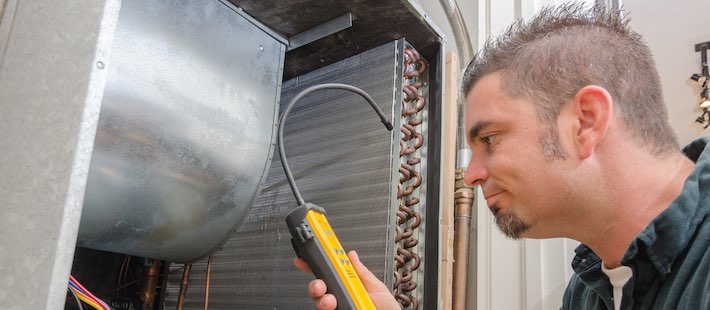
4 Most Common AC Repairs During the Summer
Living in Florida, during the summer, it’s only a matter of time until you hear people complaining about their power bill. “I keep my AC at the same temperature year-round, yet my utilities are so much more expensive right now!” Or maybe you’ve experienced the issue yourself.
No, nobody’s imagining things and power companies are not out to get you.
1. AC leaking water
There are several reasons why your AC may be dripping water. We’ve listed the most common ones below:
Dirty air filters. An AC works by absorbing the warm air inside your home. Once inside the air conditioner, the warm air condenses, causing water droplets to drip into a dripping pan. The water is then drained out of your home through a pipe called a condensate line.
If your air filters are covered with dirt pet hair, and dust bunnies, the air flow will become obstructed. This means your AC will keep running without blowing cool air.
What makes this worse is that in addition to having a hot home during the summer, your air conditioner will keep running in futile attempts to reach the temperature set on your thermostat. So you’ll be sweating like you’re broiling outside and get higher energy bills, to boot.
In order to skip this headache and associated extra costs, change your air filters regularly. [Link “How Often Do I Have to Change My Air Filters” blog where it says “change your air filters regularly”, once it’s published, please].
Frozen evaporator coils. When the air filters are clogged with dirt and air flow is obstructed, water that ordinarily drips into the drip pan will remain on the air conditioner’s coil. With nowhere to go and the refrigerant turning warm air into cold air, the water will freeze on the coils, creating a layer of ice. The longer you go without changing the filters, the thicker the layer of ice becomes. At some point, this block of ice will start to melt, and you’ll see droplets of water coming out of your unit.
To unfreeze the coils, shut off the air conditioner (even safer, turn off the breaker that powers it too). Take out the filters and either wash or change them (depending on the filters you have. Always consult the manual). Then use a hair dryer on its lowest setting to melt the ice. Dry up the puddle of water and turn on the AC again.
Rusted drip pan. Even if you take care of your air conditioner by providing proper maintenance, at some point the constant dripping of water into the drip pan is going to cause rust. If you see rust when you remove the filter, see here for instructions on how to replace the pan; or better yet, call an experienced HVAC professional to do it for you.
If you choose to go the DIY route, always remember to shut off your air conditioner before you do any work on it.
2. AC not cooling
Another issue an AC can have is either not cooling as well as it once did, or not cooling at all. While this is really frustrating, it may have a simple fix. Some of the more common reasons for this problem include:
Dirty air filters. Here’s that pesky little problem again. As you see, changing your air filters regularly can save you a lot of time, money, and trouble in the long haul. So set regular reminders on your phone or calendar and get it done.
The condensate line is clogged. The same way your air filters get dirty, the condensate line can get clogged with sludge, dirt, mold, mildew, algae, and whatever else made its way into the pipe.
You can prevent this from happening with regular maintenance on your AC system. See this video tutorial on how to unclog it yourself.
There’s a refrigerant leak. You’ll know you have a leak if, in addition to not cooling your home, you can hear a hissing sound coming from your AC and/or it’s humid inside your home even though the AC is running. Another sign is frost on the condenser unit (the big box that sits outside your home).
Refrigerant is a gas that’s used to cool the air the AC absorbs from your home. While it does wonders for climate control, it can be poisonous to breathe. So if you suspect a leak is the issue, call an HVAC professional immediately. Don’t wait for business hours. This is an emergency and should be treated as such.
3. Clogged condenser line
Clogged condenser lines and how to clean them was mentioned above. However, be mindful that excess humidity during the summer months increase the likelihood of mold growing inside the pipe. As previously mentioned, while there are DIY ways to take care of this, the best thing to do is leave it in the hands of an HVAC technician.
4. Refrigerant Leak
We also discussed a refrigerant leak as a cause for an air conditioner not cooling your home, it’s important to note that this issue tends to happen more often during the summer. This is because extreme weather such as high heat, humidity, and thunderstorms cause the outside portions of the air conditioner to corrode faster.
If you’re faced with this issue, the only thing you can do is call an HVAC professional. This is because EPA regulations only allow certified technicians to purchase refrigerant.
Symptoms associated with refrigerant leaks
Since extended exposure to refrigerant is hazardous to your health, it’s good to be aware of some of the most common warning signs:
– Headaches
– Dizziness
– Nausea
– Difficulty breathing
– Eye irritation
– Sore throat
– Coughing fits
It sounds scary because it can be. To avoid this situation, schedule regular maintenance for your system. If you haven’t experienced a refrigerant leak yet, an HVAC technician can determine whether your AC system is at risk for this problem and take appropriate steps to prevent it.
Call our HVAC professionals at A Plus Air Conditioning and let us help you!
No matter the issue with your air conditioner, we can assist you. We provide services throughout north central Florida. And because we understand that a working air conditioner is essential in Florida, we offer 24/7 AC emergency service.
Call us at (352) 374-4988 and let us get your AC back to proper working order.


